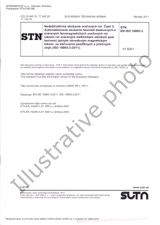We need your consent to use the individual data so that you can see information about your interests, among other things. Click "OK" to give your consent.

STN EN 62209-2 (367080)
Vystavenie človeka účinkom vysokofrekvenčných polí z ručných bezdrôtových komunikačných zariadení a zariadení upevnených na tele. Ľudské modely, prístrojové vybavenie a postupy. Časť 2: Postupy na stanovenie špecifickej miery absorpcie (SAR) pri mobilných bezdrôtových komunikačných zariadeniach, ktoré sa používajú v bezpečnostnej vzdialenosti od ľudského tela (frekvenčný rozsah od 30 MHz do 6 GHz) (Norma na priame používanie ako STN). (Norma sa môže používať bez zmeny A1 do 21.6.2022). (Platnosť do 19.11.2024).
Automatically translated name:
Human exposure frequency fields from hand-held wireless communication devices and equipment mounted on the body. Human models, instrumentation and procedures. Part 2: Procedures for determining the specific absorption rate (SAR) for mobile wireless communications devices, which are used in safety distance from the human body (frequency range from 30 MHz to 6 GHz) (IEC STN).
STANDARD published on 1.10.2010
| Format |
|
| Availability | The sale has ended |
| Price | ONREQUEST excl. VAT |
| ON REQUEST |
The information about the standard:
Designation standards: STN EN 62209-2
Classification mark: 367080
Catalog number: 111792
Note: WITHDRAWN
Publication date standards: 1.10.2010
SKU: NS-531821
The number of pages: 118
Approximate weight : 385 g (0.85 lbs)
Country: Slovak technical standard
Category: Technical standards STN
We recommend simillar standard:!
ČSN EN 62209-2 (01.02.2011)We recommend:
Technical standards updating
Do you want to make sure you use only the valid technical standards?
We can offer you a solution which will provide you a monthly overview concerning the updating of standards which you use.
Would you like to know more? Look at this page.



 Cookies
Cookies
